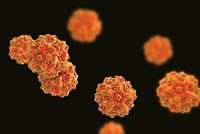Advertisement
Grab your lab coat. Let's get started
Welcome!
Welcome!
Create an account below to get 6 C&EN articles per month, receive newsletters and more - all free.
It seems this is your first time logging in online. Please enter the following information to continue.
As an ACS member you automatically get access to this site. All we need is few more details to create your reading experience.
Not you? Sign in with a different account.
Not you? Sign in with a different account.
ERROR 1
ERROR 1
ERROR 2
ERROR 2
ERROR 2
ERROR 2
ERROR 2
Password and Confirm password must match.
If you have an ACS member number, please enter it here so we can link this account to your membership. (optional)
ERROR 2
ACS values your privacy. By submitting your information, you are gaining access to C&EN and subscribing to our weekly newsletter. We use the information you provide to make your reading experience better, and we will never sell your data to third party members.
Gene Therapy
Jim Wilson launches liver disease gene-editing company iECURE with $50 million
The gene therapy pioneer says gene editing will work better for some conditions, especially those affecting infants
by Ryan Cross
September 9, 2021
| A version of this story appeared in
Volume 99, Issue 33

The gene therapy pioneer Jim Wilson is starting his third company in 3 years. The start-up, called iECURE, launched with $50 million in series A financing to develop up to 13 gene-editing therapies based on research from Wilson’s team of more than 300 people at the University of Pennsylvania Gene Therapy Program.
The company’s name (pronounced ee-ah-cure) is inspired by the Latin word for liver, iecur, and its initial focus will be on treating severe liver disease in newborns, Wilson says. Two of its lead programs are for ornithine transcarbamylase (OTC) deficiency and phenylketonuria (PKU). A third program, in partnership with the gene-editing company Precision Biosciences, will focus on reducing cholesterol in familial hypercholesterolemia.
Like Wilson’s previous two start-ups, Passage Bio and G2 Bio, his new company will maintain an intimate relationship with his lab. The start-up has signed research and licensing agreements with UPenn for Wilson’s lab to conduct preclinical research, manufacture small batches of therapies, and even file paperwork for permission for iECURE to start clinical studies in humans. “I can’t tell you what a luxury it is that I don’t have to recruit anyone” for those tasks, CEO Joseph Truitt says. “Having started companies from nothing, I feel like we are sprinting, and we just started.”
The start-up’s program for OTC deficiency has a long history. The disease is one of several urea cycle disorders caused by genetic mutations that lead to the toxic accumulation of ammonia. Kids born with the disease are placed on diets that strictly limit protein intake. Although a liver transplant can cure the disease, few families undergo the procedure.
Wilson has worked on OTC deficiency for more than 25 years, and it has shaped his career and the gene-therapy field at large. In 1999, an 18-year-old boy died after receiving a high dose of Wilson’s experimental gene therapy for the disease. Researchers linked the death to a massive immune response caused by the high dose of the adenovirus used to deliver DNA in the boy’s liver. Most scientists stopped using adenoviruses for gene therapy, and Wilson spent the next decade looking for a safer alternative.
He found the answer in adeno-associated virus (AAV). Today, AAV is the mainstay of the gene-therapy industry. An AAV-based therapy for OTC deficiency that has its origins in Wilson’s lab is now being developed by Ultragenyx Pharmaceutical. Preliminary results look promising but the clinical trial is limited to adults with the disease because animal studies suggest that the therapy might not work well in infants or children.
When Wilson’s lab tested the therapy in newborn mice, its effects were short-lived, likely because AAV doesn’t integrate into the chromosomes, he says. As mice—or kids—grow up, their liver cells divide, and the therapy essentially gets “diluted out.” Wilson thinks the gene-editing approach could solve this problem: an enzyme cuts a person’s DNA at a specific location and stitches in a new therapeutic piece of DNA, allowing it be faithfully copied into future liver cells.
Although Wilson’s lab has tested this approach with CRISPR gene editing, he is more excited about a different gene-editing system developed by Precision Biosciences called Arcus, which is based on a family of enzymes called endonucleases. Precision and UPenn first announced a collaboration to develop gene-editing therapies with Arcus in 2018, and when Wilson saw how efficient the technology was at editing liver cells in monkeys, he was sold. Precision and iECURE will collaborate on the gene-editing program for familial hypercholesterolemia, and iECURE has licensed Arcus for use in specific liver diseases.
For now, iECURE’s gene-editing approach will rely on AAVs for delivery. One AAV will encode genetic instructions that allow liver cells to make the Arcus gene-editing machinery; a second AAV will encode the therapeutic gene that is slipped into the break Arcus makes in DNA. Wilson says iECURE will use new AAVs developed in his lab that are designed for optimal delivery to the liver. He also says the company may consider using alternative delivery systems, such as lipid nanoparticles, in the future.
Truitt won’t disclose timelines for the initial clinical trials, but he says the series A financing should be enough to advance multiple programs through the end of 2022.
iECURE’s financing was led by OrbiMed Advisors and Versant Ventures, two life science–focused investment firms that played a role in funding the 2019 launch of Passage Bio. Versant was also the founding investor of two CRISPR gene-editing companies: Crispr Therapeutics in 2014 and Graphite Bio in 2020.
The gene-editing field is too big for one company to cover, says Tom Woiwode, a managing director at Versant. “That’s why we’ve made three investments, and each one had its unique angle.”





Join the conversation
Contact the reporter
Submit a Letter to the Editor for publication
Engage with us on Twitter